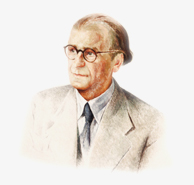History
 "I am drawing up my will so that, even after my death, my small property can contribute to the continuation of the work I consider of utmost importance for the promotion of our national culture and for the intellectual progress of our people. […] I want Greek children to benefit from my property, because they are the ones suffering due to the language confusion that predominates in our education and our life."
"I am drawing up my will so that, even after my death, my small property can contribute to the continuation of the work I consider of utmost importance for the promotion of our national culture and for the intellectual progress of our people. […] I want Greek children to benefit from my property, because they are the ones suffering due to the language confusion that predominates in our education and our life."
With these words, Manolis Triandaphyllidis justifies, in the will he drew up in May 1956, his decision to bequeath his property to the University of Thessaloniki so that the Institute that now bears his name can be founded. He himself stipulates that the Institute’s aim should be “the advance of science and the promotion of Demotic Greek and Modern Greek philology as well as the promotion of the education of the Greek people by every means available, and more specifically, through the publication of books […]”.
The great professors of the University, N. P Andriotis, I. Th. Kakridis, St. Kapsomenos, Emm. Kriaras, L. Politis, A. Tsopanakis and Ch. Fragistas were called upon to fulfill his wish. They formed the Institute’s first Board of Directors , in accordance with Triandaphyllidis’ will. The lawyer Mr. Ch. Christidis, M. Triandaphyllidis’ close friend and executor of his will, also played a key role in the Institute’s future. M. Andronikos, I. Deligiannis, D. Iakov, D. Lipourlis, I. Manoledakis, D. N. Maronitis, St. Matthaios, P. Moullas, N. Papandoniou, G. Savidis, M. Setatos, G. Sifakis, K. Tsantsanoglou and A.-F. Christidis have also been members of the Board of Directors .
In the first decade since the Institute’s inception the publication of the Collected Works of M. Triandaphyllidis was completed. In the following years the Institute undertook the publication of significant works on the Greek language, such as N. P. Andriotis, Etymological dictionary of standard Modern Greek, two books on the history of the Greek Language by N. P. Andriotis and St. Kapsomenos, and A. Mirambel, The Modern Greek language. The Institute also began publishing translations of linguistic textbooks, such as A. Martinet’s Elements of general linguistics, and launched its series of books on the teaching of Modern Greek as a second/foreign language with the volume entitled Modern Greek for learners.
At the same time, during the early years of the regime change, the Institute, with its status and especially with its publications, contributed to the establishment of Demotic Greek and the implementation of the principles of the 1976 language-educational reform (the preparation of the first school grammar of Demotic Greek, the adaptation of state documents to the new official language etc.). Furthermore, it undertook the compilation of a dictionary of Modern Greek, which was eventually published two decades later. However, already in 1986 a sample of the dictionary containing the letters Ζ (zeta), Η (eta), Θ (theta), Ι (iota) is published, whose influence becomes immediately evident in the field of Modern Greek lexicography.
The completion and publication of the Dictionary of Standard Modern Greek in 1998 marked the beginning of a new era, as the Institute, now unham-pered by work on the Dictionary, planed and implemented a broader publishing agenda, always in the spirit of Triandaphyllidis' philosophy and wishes. A series of university textbooks is created, the series of linguistic textbooks is continued, significant philological publications are added and the activity in the field of the teaching of Modern Greek as a second-foreign language is expanded. The Concise Grammar of Modern Greek is translated and published in 14 languages. The Institute also participates in the publication of the History of the Greek Language: From its beginnings to late antiquity, edited by A. F. Christidis, in collaboration with the Center for the Greek Language. The series entitled «Αρχαιογνωσία και αρχαιογλωσσία στη Μέση Εκπαίδευση» [Archaiognosia and Archaioglossia in Secondary Education] once again brings the Institute close to the students and teachers of Secondary Education. Finally, the first volumes of a series containing texts of the early Modern Greek literature (edited by A. van Gemert and G. Kechagioglou) are published.
Over the past years, the foundations of research activity in the fields of Modern and Ancient Greek dialectology are laid, on the occasion of the preparation of the volumes Modern Greek Dialects, edited by Ch. Tzitzilis, and Ancient Greek Dialects, edited by Ch. Tzitzilis and A. Bartonek. This activity has established the Institute as the leading dialect research centre in Northern Greece. The Institute is also preparing the translation of the voluminous Etymological Dictionary of Ancient Greek by P. Chantraine (edited by D. Christidis & G. Papanastassiou). The Institute of Modern Greek Studies is directed by a seven-member Board of Directors , now formed by Professors G. M. Parassoglou, Chr. Tzitzilis, G. Kechagioglou, Th.-S Pavlidou and V. Kalfas from the Faculty of Philosophy, and by Professor N. Paraskevopoulos from the Faculty of Law.
Currently, G. M. Parassoglou acts as Chairman of the Board of Directors and G. Papanastassiou is the Institute’s Director. The Institute’s offices are located in room 418 of the New Building of the Faculty of Philosophy at the Aristotle University of Thessaloniki, and in 152, Egnatia str., on the sixth floor, where the researchers and the friends of the Institute are always welcome.



